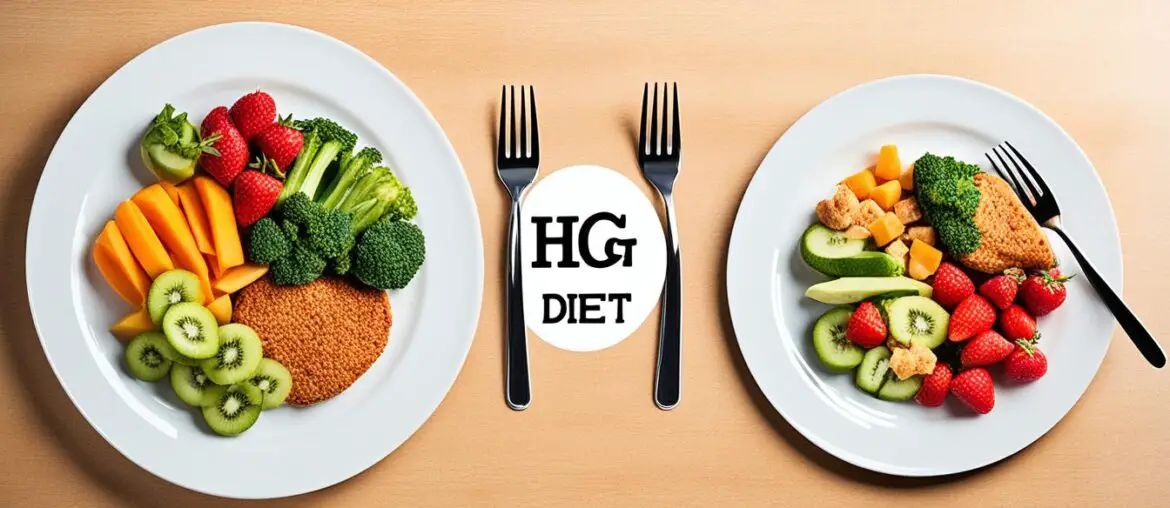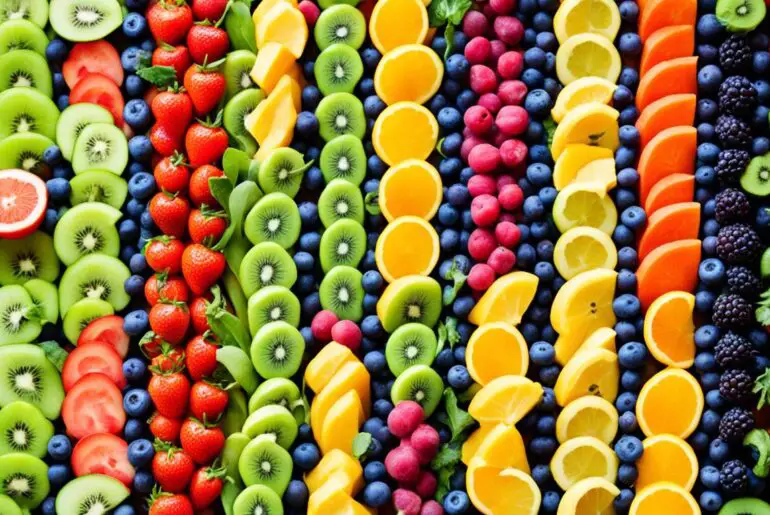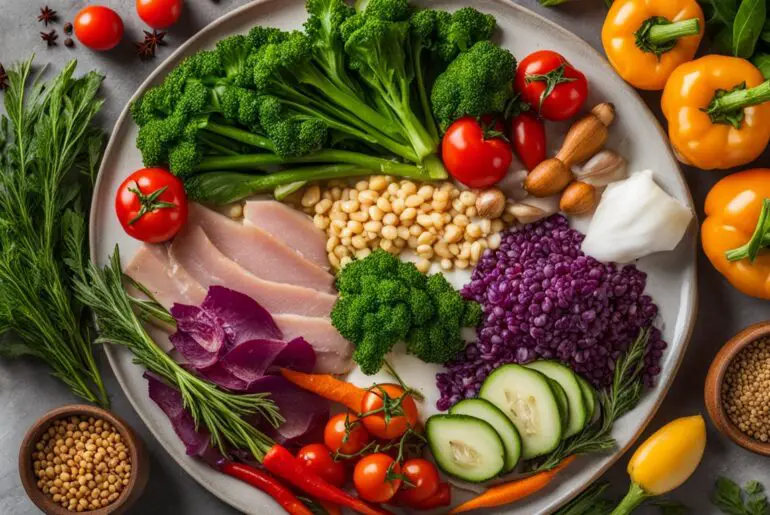Did you know that after completing the HCG diet, many people struggle to maintain their weight? It’s true! Despite the success of the HCG diet for weight loss, transitioning to a regular diet can be challenging and often leads to weight gain. But don’t worry, with the right strategies and mindset, you can navigate this transition and maintain your weight loss in the long term.
Key Takeaways:
- Transitioning from the HCG diet to a regular diet requires careful attention to calorie intake, diet routine, exercise, and lifestyle changes.
- Gradually increasing calorie intake and reintroducing sugars and starches in moderation are important steps in transitioning off the HCG diet.
- Avoiding sudden changes and following the maintenance phase guidelines are crucial for maintaining weight loss.
- Motivation, exercise, and sufficient sleep play key roles in maintaining weight and preventing weight gain after the HCG diet.
- By following these tips and making sustainable choices, you can achieve long-term success in maintaining your weight loss.
The Problem with HCG Dieters.
HCG dieters often face a common challenge: maintaining their weight after completing the HCG diet. While the HCG injections are effective in promoting weight loss and resetting the metabolism, discontinuing the injections can trigger a state of starvation mode in the body. This can lead to the body holding on to calories and, ultimately, weight gain.
To overcome this problem and sustain the weight loss achieved during the HCG diet, it is essential for dieters to make dietary and lifestyle adjustments. These adjustments will help the body transition smoothly from the HCG protocol to a regular eating plan without experiencing significant weight fluctuations.
One of the key factors in preventing weight gain after the HCG diet is to adopt a gradual approach to calorie intake. Rather than abruptly increasing calorie consumption, HCG dieters should slowly reintroduce healthy and balanced meals into their daily routine. This gradual transition allows the body to adjust to the new eating habits and prevents sudden weight regain.
In addition to dietary adjustments, incorporating regular exercise into the post-HCG diet routine is crucial. Exercise helps to maintain muscle mass and boost metabolism, aiding in the long-term maintenance of weight loss. It is important to find an exercise routine that one enjoys and can sustain to optimize the benefits.
Overall, HCG dieters can overcome the weight gain challenge by making conscious choices about their diet and lifestyle. By implementing gradual changes, establishing a balanced eating plan, and incorporating regular exercise, individuals can successfully maintain their weight loss and achieve long-term success.
Maintaining Weight After HCG Diet.
After successfully completing the HCG diet, the key to maintaining your weight lies in a gradual approach. Abrupt changes in calorie intake can disrupt the body’s equilibrium and lead to weight regain. To maintain a healthy weight, it is crucial to focus on three key aspects: calorie intake, normal diet routine, and exercise routine.
Gradually Increase Calorie Intake
To ensure a smooth transition from the HCG diet to a regular eating pattern, it is recommended to gradually increase your calorie intake. The optimal number of calories to consume can be calculated based on your current body weight. This gradual increase allows the body to adjust to higher calorie levels without triggering weight fluctuations or unwanted weight gain.
Bring Back a Normal Diet Routine
As you transition to a regular diet, it’s important to reintroduce sugars and starchy foods in moderation. Slowly incorporating these food groups into your diet can help stabilize your metabolism and prevent sudden spikes in blood sugar levels. By gradually reintroducing these foods, you can strike a balance between maintaining your weight and enjoying a varied and balanced diet.
Formulate an Exercise Routine
Regular physical activity is vital for maintaining weight loss and overall well-being. Developing an exercise routine that suits your lifestyle can help burn calories, increase metabolism, and improve muscle tone. Whether it’s through cardiovascular exercises, strength training, or a combination of both, finding activities that you enjoy and can consistently engage in will contribute to long-term weight maintenance.
By following these guidelines for maintaining weight after the HCG diet, you can successfully transition into a healthy, sustainable eating plan and achieve long-term weight loss success.
| Day | Activity | Duration |
|---|---|---|
| Monday | Jogging | 30 minutes |
| Tuesday | Strength training | 45 minutes |
| Wednesday | Yoga | 1 hour |
| Thursday | Swimming | 45 minutes |
| Friday | Hiking | 2 hours |
| Saturday | Rest day | – |
| Sunday | Cycling | 1 hour |
The Transition Period from Phase 2 to Phase 3 of the hCG Program.
During the hCG program, the transition from Phase 2 to Phase 3 is a critical phase in achieving long-term weight maintenance. This transition period marks the end of hCG injections and the start of a regular eating plan. Lasting for approximately 72 hours, it is important to adhere to the guidelines for this phase to ensure a smooth progression from the very low calorie diet (VLCD) to a sustainable eating routine.
The transition period involves continuing the 500-calorie VLCD without hCG injections. This phase allows the body to adjust gradually to the absence of hCG while maintaining the calorie restriction necessary for weight loss. It is crucial to understand the timing of this transition period and follow the instructions provided by the hCG program to ensure optimal results.
Continuing the VLCD during the transition period helps the body maintain the metabolic state achieved during Phase 2. It also supports the body’s ability to efficiently use stored fat as fuel, aiding in the preservation of weight loss. By following the prescribed calorie intake and food choices, individuals can successfully navigate this phase and progress towards long-term weight maintenance.
Understanding the significance of the transition period from Phase 2 to Phase 3 is essential for the overall success of the hCG program. It marks a critical juncture in the journey towards sustainable weight loss and maintenance. By diligently adhering to the dietary guidelines during this phase, individuals can maximize the benefits of the hCG program and achieve their desired weight management goals.
What to Do During the Transition Phase.

During the transition phase from the hCG diet, it is crucial to take the right steps to maintain the weight loss you achieved and ease your body into a regular eating plan. Here’s a guide on what to do during this important phase:
1. Continue Following the 500-Calorie VLCD
For the first 72 hours of the transition phase, it is recommended to stick to the 500-calorie very low calorie diet (VLCD) that you followed during the hCG diet. This continued restriction helps your body maintain the weight loss achieved during the diet.
2. Gradually Increase Calorie Intake
As the 72-hour mark approaches, you may start to feel hungrier. It is essential to gradually increase your calorie intake towards the end of the transition phase. This allows your body to adjust and prevents sudden weight fluctuations. Consider adding an extra 200 calories per day as you near the end of the phase.
3. Avoid Fats/Oils
During the transition phase, it is advisable to continue avoiding fats and oils in your diet. These can be harder for your body to process and may hinder the transition process. Focus on nourishing your body with lean proteins, fruits, vegetables, and whole grains.
By following these steps during the transition phase, you can seamlessly transition off the hCG diet and maintain the weight loss you achieved. Remember, consistency is key in achieving long-term success in managing your weight.
Understanding the Importance of the Maintenance Phase.
The maintenance phase plays a crucial role in the hCG diet as it helps prevent weight gain and maintain the weight loss achieved during the diet. This phase typically lasts for at least three weeks to allow the body to set a new weight point and stabilize at the desired weight.
During the maintenance phase, it is important to follow specific guidelines to ensure long-term success. Deviating from the maintenance phase can result in weight gain and undo the progress made during the diet.
“The maintenance phase is the bridge between the hCG diet and a sustainable, healthy lifestyle. It allows the body to adjust and establish a new equilibrium, ensuring that the weight loss achieved is maintained,” says Dr. Maria Johnson, a leading expert in weight management.
The maintenance phase focuses on gradually reintroducing foods, establishing a healthy eating plan, and making sustainable lifestyle changes. This phase helps the body adapt to a higher calorie intake while still maintaining a balanced diet and preventing weight gain.
During this phase, it is essential to monitor calorie intake, paying attention to portion sizes and nutrient composition. Regular exercise remains crucial, as it helps maintain muscle tone and supports the body’s overall metabolism.
Key Guidelines for the Maintenance Phase
| Guidelines | Description |
|---|---|
| Calorie Intake | Gradually increase calorie intake based on individual needs, ensuring a healthy balance of macronutrients. |
| Food Choices | Reintroduce a wider variety of foods, including fruits, vegetables, lean proteins, and whole grains. |
| Exercise | Continue with regular exercise, incorporating cardio and strength training activities to support weight maintenance. |
| Lifestyle Changes | Adopt healthier habits such as mindful eating, stress management, and adequate sleep for long-term success. |
By following the maintenance phase guidelines, individuals can effectively transition to a sustainable eating plan and maintain their weight loss. It is important to remember that the maintenance phase is a continuous process, and making healthy choices on a daily basis is key to long-term success.
Tips for Maintaining Weight Loss After the HCG Diet.

After successfully completing the HCG diet and achieving weight loss, it is important to adopt strategies to maintain your progress in the long term. Here are some essential tips that can help you maintain weight loss after the HCG diet:
Gradually Increase Calorie Intake
Maintaining weight loss requires a delicate balance in calorie intake. Gradually increasing your calorie intake post-HCG diet allows your body to adjust without causing weight fluctuations. Start by incrementing your calorie consumption by approximately 200 calories per day, and continue to increase until reaching an optimal daily amount of around 1500 calories.
Slowly Reintroduce Starches and Sugars
Caloric restriction is a key aspect of the HCG diet, but to maintain your weight loss, it’s important to reintroduce starches and sugars gradually. Start by incorporating small portions of whole grains, fruits, and natural sweeteners into your meals. Monitor how your body responds and make adjustments accordingly.
Understand Your Motivations for Eating
Emotional eating can be a challenge when trying to maintain weight loss. Take time to explore and understand your motivations for eating. Are you eating out of hunger, boredom, stress, or other emotional triggers? Developing healthy coping mechanisms and addressing underlying emotional factors can help you maintain a balanced approach to eating.
Start Exercising Regularly
Exercise plays a crucial role in maintaining weight loss and overall well-being. Incorporate at least 150 minutes of moderate-intensity aerobic exercise, such as brisk walking or cycling, into your weekly routine. Additionally, include strength training exercises to build lean muscle mass and boost your metabolism.
Get Adequate Sleep
Sleep is often overlooked but essential for weight maintenance. Aim for 7-9 hours of quality sleep per night. Sufficient rest helps regulate hunger hormones, reduces stress, and supports overall healthy habits.
| Tips for Maintaining Weight Loss After the HCG Diet |
|---|
| Gradually Increase Calorie Intake |
| Slowly Reintroduce Starches and Sugars |
| Understand Your Motivations for Eating |
| Start Exercising Regularly |
| Get Adequate Sleep |
By following these tips for maintaining weight loss after the HCG diet, you can successfully transition to a regular eating plan and sustain the progress you’ve made. Remember that consistency, balance, and a holistic approach to health are key to long-term weight maintenance.
Importance of Gradually Increasing Calorie Intake.
After completing the HCG diet, it’s essential to gradually increase your calorie intake to avoid confusing the body and prevent weight gain. Abruptly returning to a normal diet routine can potentially shock the system and lead to fluctuations in weight. To ensure a smooth transition, it is recommended to incrementally raise your calorie intake over time.
Starting with a calorie increment of 200 kcal per day is a safe and effective approach. This gradual increase allows the body to adjust to the new calorie intake gradually, helping to maintain the weight loss achieved during the HCG diet. As you progress, you can continue to gradually increase your calorie intake until reaching the general optimum amount of 1500 kcal per day.
By gradually increasing calorie intake, you can avoid confusion in the body and promote a sustainable approach to weight maintenance. It provides the necessary time for your body to adapt to the changes and stabilize your weight without the risk of sudden weight fluctuations.
Remember, the key is to be patient and consistent during this process. Gradually increasing your calorie intake will help your body find balance and prevent weight gain, allowing you to maintain the benefits of the HCG diet in the long term.
Benefits of Gradually Increasing Calorie Intake:
- Prevents confusion in the body
- Helps maintain weight loss
- Reduces the risk of weight fluctuations
- Supports long-term weight maintenance
| Days | Calorie Intake (kcal) |
|---|---|
| Day 1 | 500 |
| Day 2 | 700 |
| Day 3 | 900 |
| Day 4 | 1100 |
| Day 5 | 1300 |
| Day 6 | 1500 |
Conclusion.
Transitioning from the HCG diet to a regular diet requires careful attention to calorie intake, diet routine, exercise, and lifestyle changes. Following the guidelines for maintaining weight loss and making sustainable choices is key to long-term success after the HCG diet. By gradually increasing calorie intake, bringing back a normal diet routine, and formulating an exercise routine, individuals can effectively navigate the transition phase and ensure weight maintenance.
It is important to understand that the HCG diet is just the beginning of a weight loss journey. To achieve long-term success, it is crucial to adopt a healthy eating plan for the future. This includes maintaining a balanced diet, incorporating regular exercise, and making sustainable lifestyle changes. By doing so, individuals can not only maintain the weight loss achieved during the HCG diet but also promote overall health and well-being.
In conclusion, the transition from the HCG diet to a regular diet is a critical phase in weight management. By following the proper strategies and mindset, individuals can overcome the challenges of this transition, achieve weight maintenance, and set themselves up for long-term success in their health and wellness goals.
FAQ
Can you explain the process of transitioning from the HCG diet to a regular diet?
When transitioning from the HCG diet to a regular diet, it is important to gradually increase calorie intake and bring back a normal diet routine. It is also recommended to formulate an exercise routine to maintain weight loss.
Why do many people struggle to maintain their weight after completing the HCG diet?
Many people struggle to maintain their weight after completing the HCG diet because once the HCG injections are stopped, the body can go into a state of starvation mode, making it difficult to prevent weight gain.
How can I maintain my weight after the HCG diet?
To maintain your weight after the HCG diet, it is important to gradually increase calorie intake, bring back a normal diet routine, and formulate an exercise routine. These steps will help prevent weight gain and support long-term weight maintenance.
What is the transition period from Phase 2 to Phase 3 of the hCG program?
The transition period from Phase 2 to Phase 3 of the hCG program is the time when you stop taking hCG injections and transition to a regular eating plan. It typically lasts 72 hours and involves continuing the 500-calorie very low calorie diet (VLCD) without hCG.
What should I do during the transition phase from the HCG diet?
During the transition phase from the HCG diet, it is important to continue following the 500-calorie VLCD for the first 72 hours without taking hCG injections. It is recommended to gradually increase calorie intake towards the end of the 72 hours and avoid fats/oils during this phase.
Why is the maintenance phase of the HCG diet important?
The maintenance phase of the HCG diet is crucial for preventing weight gain and maintaining the weight loss achieved during the diet. Deviating from the maintenance phase can lead to weight gain and undo the progress made during the diet.
What are some tips for maintaining weight loss after the HCG diet?
Some tips for maintaining weight loss after the HCG diet include gradually increasing calorie intake, slowly reintroducing starches and sugars, understanding motivations for eating, starting an exercise routine, and getting enough sleep.
Why is it important to gradually increase calorie intake after the HCG diet?
Gradually increasing calorie intake after the HCG diet is important to avoid confusing the body and prevent weight gain. Starting with a calorie increment of 200 kcal per day and gradually increasing it until reaching the general optimum amount of 1500 kcal per day is recommended.
What is the importance of the HCG diet to regular diet transition?
The HCG diet to regular diet transition is crucial for maintaining weight loss and adopting a healthy eating plan for the future. Following the guidelines for maintaining weight loss and making sustainable choices is key to long-term success after the HCG diet.




